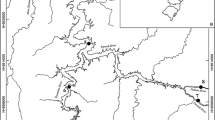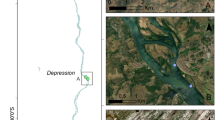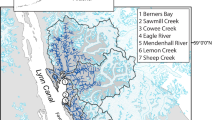Abstract
During the summer of 2004, four hurricanes (Charley, Frances, Ivan, and Jeanne) affected Florida between August 13 and September 27. Two storms (Frances: category 2 and Jeanne: category 3) made landfall in the southern portion of the Indian River Lagoon (IRL) on the east-central coast of Florida. The presence of Florida Fish and Wildlife Conservation Commission's long-term fisheries monitoring program in the IRL provided a unique opportunity to examine the effects of large tropical events on estuarine fish communities. Increased sampling efforts to monitor the effects of tropical disturbances on the fish community within the IRL and one of its major tributaries (St. Sebastian River) were initiated within days after the passing of the last hurricane (Jeanne). The objectives of the study were to characterize changes to the composition of the fish community within the lagoon and river immediately after the passage of two hurricanes, and to examine the recovery of the fish communities. Analyses indicated that immediately after the last hurricane passed, community diversity within the estuary decreased following these storms due to the absence of many marine species, whereas the fish community within the St. Sebastian River shifted to one containing a greater percentage of freshwater species. Recovery of the community structure to pre-hurricane conditions was evident within several weeks following the last hurricane, and by mid December 2004 (ca. 3 mo after the last storm), there was little difference between the pre-hurricane and post-hurricane fish communities.
Similar content being viewed by others
Literature Cited
Arnold, W. S., T. M. Bert, I. R. Quitmeyer, andD. S. Jones. 1998. Contemporaneous deposition of annual growth bands inMercenaria mercenaria (Linnaeus),Mercenaria campechiensis (Gmelin), and their natural hybrid forms.Journal of Experimental Marine Biology and Ecology 223:93–109.
Bergman, M. J. andL. J. Donnangelo. 1998. Simulation of freshwater discharges to the Sebastian River using regional parameters. Technical Memorandum No. 25. Department of Water Resources, St. Johns Water Management District, Palatka, Florida.
Bortone, S. A. 1976. Effects of a hurricane on the fish fauna at Destin, Florida.Florida Scientist 39:245–248.
Bouchon, C., Y. Bouchon-Navaro, and M. Louis. 1994. Changes in the coastal fish community following Hurricane Hugo in Guadeloupe Island (French West Indies). National Museum of Natural History, Smithsonian Institution, Atoll Research Bulletin 422, Washington, D.C.
Burkholder, J., D. Eggleston, H. Glasgow, C. Brownie, R. Reed, G. Janowitz, M. Posey, G. Melia, C. Kinder, R. Corbett, D. Toms, T. Alphin, N. Deamer, andJ. Springer. 2004. Comparative impacts of two major hurricane seasons on the Neuse River and western Pamlico Sound ecosystems.Proceedings of the National Academy of Sciences 101:9291–9296.
Bythell, J. C., Z. M. Hillis-Starr, andC. S. Rodgers. 2000. Local variability but landscape stability in coral reef communities following repeated hurricane impacts.Marine Ecology Progress Series 204:93–100.
Clarke, K. R. andR. M. Warwick. 1994. Change in Marine Communities: An Approach to Statistical Analysis and Interpretation, 2nd edition. Natural Environment Research Council United Kingdom, Swindon, Wilts.
Higgs, D. M. andL. A. Fuiman. 1998. Associations between sensory development and ecology in three species of clupeoid fish.Copeia 1:133–144.
Hutchinson, N. andG. A. Williams. 2003. Disturbance and subsequent recovery of mid-shore assemblages on seasonal, tropical, rocky shores.Marine Ecology Progress Series 249:25–38.
Jarrell, J. D., M. Mayfield, E. N. Rappaport, and C. W. Landsea. 2001. The deadliest, costliest, and most intense United States hurricanes from 1900 to 2000 (and other frequently requested hurricane facts). National Oceanographic and Atmospheric Administration, Technical memorandum NWS TPC-1, Miami, Florida.
Jury, S. H., W. H. Howell, andW. H. Watson III. 1995. Lobster movements in response to a hurricane.Marine Ecology Progress Series 119:305–310.
Kremen, C. 1992. Assessing the indicator properties of species assemblages for natural areas monitoring.Ecological Applications 2:203–217.
Litaker, R. W. and P. A. Tester. 2003. Extreme events and ecological forecasting, p. 85–91.In N. Valette-Silver and D. Scavia (eds.), Ecological Forecasting: New Tools for Coastal and Marine Ecosystem Management. National Oceanographic and Atmospheric Administration Technical Memorandum NOS-NCCOS-1, Beaufort, North Carolina.
Ludwig, J. A. andJ. F. Reynolds. 1988. Statistical Ecology: A Primer on Methods and Computing. Wiley, New York.
Lyons, K. G., C. A. Brigham, B. H. Traut, andM. W. Swartz. 2005. Rare species and ecosystem functioning.Conservation Biology 19:1019–1024.
Mallin, M. M., M. H. Posey, M. R. McIver, D. C. Parsons, S. H. Ensign, andT. D. Alphin. 2002. Impacts and recovery from multiple hurricanes in a Piedmont-coastal plain river system.Biosciences 52:999–1010.
Paerl, H. W., J. D. Bales, L. W. Ausley, C. P. Buzzelli, L. B. Crowder, L. A. Eby, J. M. Fear, M. Go, B. L. Peierls, T. L. Richardson, andJ. S. Ramus. 2001. Ecosystem impacts of three sequential hurricanes (Dennis, Floyd, and Irene) on the United States' largest lagoonal estuary, Pamlico Sound, NC.Proceedings of the National Academy of Sciences 98:5655–5660.
Paperno, R. andR. B. Brodie. 2004. Effects of environmental variables upon the spatial and temporal structure of a fish community in a small, freshwater tributary of the Indian River Lagoon, Florida.Estuarine Coastal and Shelf Science 61:229–241.
Paperno, R., K. J. Millie, andE. Kadison. 2001. Patterns in species composition of fish and selected invertebrate assemblages in estuarine subregions near Ponce De Leon Inlet, Florida.Estuarine Coastal and Shelf Science 52:117–130.
Ruzecki, E. P., J. H. Schubel, R. J. Huggett, A. M. Anderson, M. L. Wass, R. J. Marasco, and M. P. Lynch. 1976. The effects of tropical storm Agnes on the Chesapeake Bay estuarine system. Chesapeake Bay Research Consortium. John Hopkins University Press, Publication No. 54. Baltimore, Maryland.
Sallenger, A. H., H. F. Stockdon, L. Fauver, M. Hansen, D. Thompson, C. W. Wright, andJ. Lillycrop. 2006. Hurricanes 2004: An overview of their characteristics and coastal change.Estuaries and Coasts 29:880–888.
Steward, J. S., R. W. Virnstein, M. A. Lasi, L. J. Morris, J. D. Miller, L. M. Hall, andW. A. Tweedale. 2006. The impacts of the 2004 hurricanes on hydrology, water quality, and seagrass in the central Indian River Lagoon, Florida.Estuaries and Coasts 29:954–965.
Tremain, D. M. andD. H. Adams. 1995. Seasonal variations in species diversity, abundance, and composition of fish communities in the northern Indian River Lagoon, Florida.Bulletin of Marine Science 57:171–192.
Walker, B., A. Kinzig, andJ. Langridge. 1999. Plant attribute diversity, resilience, and ecosystem function: The nature and significance of dominant and minor species.Ecosystems 2:95–113.
White, P. S. andA. Jentsch. 2001. The search for generality in studies of disturbance and ecosystem dynamics.Progress in Botany 62:399–449.
Winner, B. L. andR. H. McMichael Jr. 1997. Evaluation of a new type of box splitter designed for subsampling estuarine ichthyofauna.Transactions of the American Fisheries Society 126:1041–1047.
Author information
Authors and Affiliations
Corresponding author
Rights and permissions
About this article
Cite this article
Paperno, R., Tremain, D.M., Adams, D.H. et al. The disruption and recovery of fish communities in the Indian River Lagoon, Florida, following two hurricanes in 2004. Estuaries and Coasts: J ERF 29, 1004–1010 (2006). https://doi.org/10.1007/BF02798662
Received:
Revised:
Accepted:
Issue Date:
DOI: https://doi.org/10.1007/BF02798662




